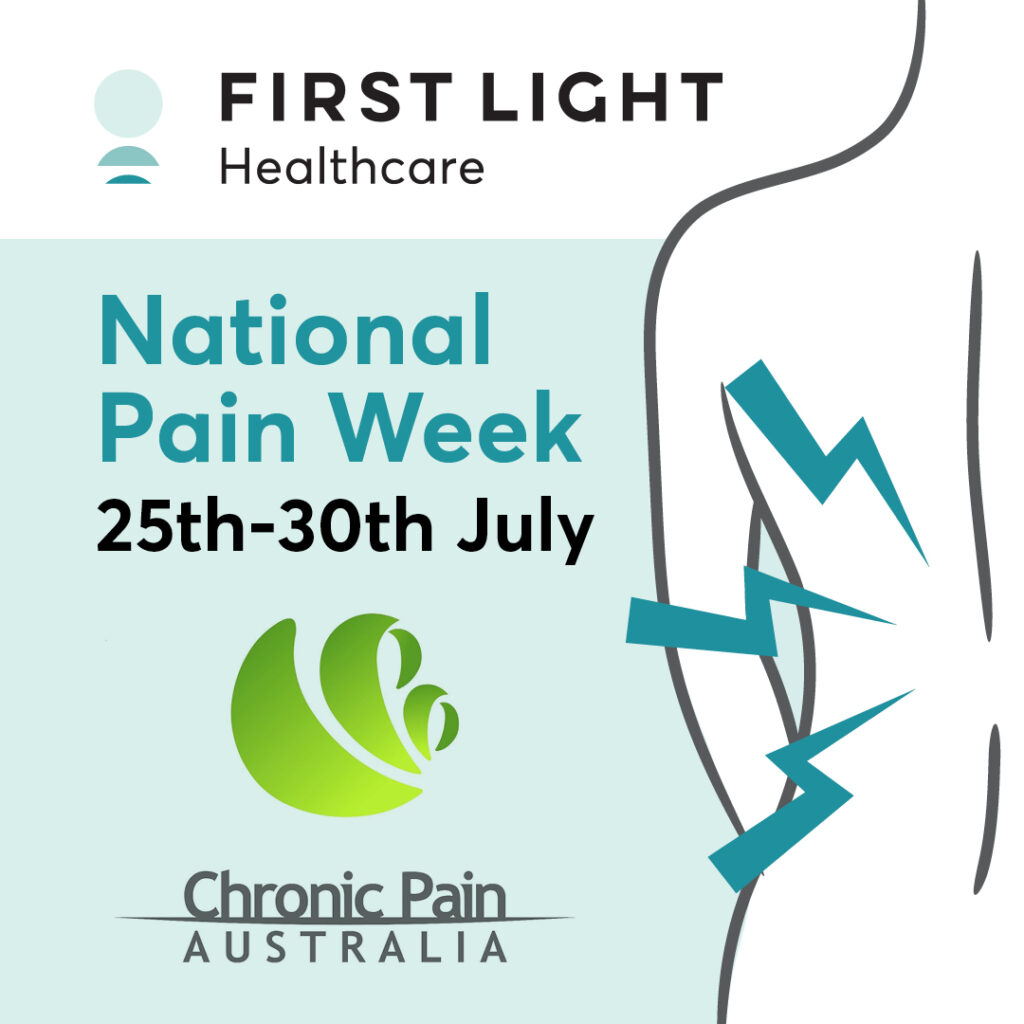National Pain Week

National Pain Week, from July 25 to July 31 is an annual awareness week that is coordinated by Chronic Pain Australia. Chronic pain affects more than 3.6 million Australians, and it can be debilitating, exhausting and can affect all aspects of a person’s life.*
Increased awareness thanks to initiatives such as the National Pain Week, plus the growing range of treatments for chronic pain in recent years is vitally important as it is helping to improve the outcomes and overall wellbeing of those who are affected by chronic pain.
What is Chronic Pain?
Pain is an unpleasant or uncomfortable body experience that is caused by an activation of the nervous system. Pain is often caused by a known injury, illness or medical condition, but sometimes the cause is unknown.
While most of us experience short-term (acute) pain, this often occurs after surgery, trauma or illness and usually only lasts for a short period of time before the body heals and the pain subsides. Chronic pain on the other hand can last for months, or even years.
Chronic pain is defined by pain that lasts for more than three months, or beyond the normal healing time of a trauma or illness. *
What Causes Chronic Pain?
Pain can serve an important function if you have an injury. The nerves carry signals from the injured part of your body to the brain, alerting the brain that there’s a problem. But when someone has chronic pain, the nerves that carry pain signals to the brain, or the brain itself, can behave in an unusual and often unhelpful way.
Chronic pain can be caused by many conditions, including bone, muscle or joint pain from a variety of conditions, as well as pain due to cancer, or nerve pain, migraine, osteoporosis, arthritis and other musculoskeletal conditions, or the pain can be due to injury or surgery. Although chronic pain is usually a symptom of a known illness or injury, it can also be present without a known reason.
Acute pain can also develop into chronic pain if the condition is left untreated or poorly treated. The longer the pain remains untreated, the greater the risk of it becoming chronic pain.
If you are concerned about pain that is not being treated or your pain is not responding to treatment, it is important that you talk to your doctor. ***
How Does Chronic Pain Affect Mental Health?
As complex condition, chronic pain is experienced differently by everyone. The pain experienced by individuals can range from mild to severe and is typically experienced most days, though not always.
Chronic pain can also be greatly influenced by a person’s life experiences. Many people report experiencing extreme pain when dealing with negative life situations such as grief, money stress, or a relationship breakdown. Alternatively, people with chronic pain often experience a respite when they are enjoying time with good friends, having a laugh and feeling loved and cared about.
Living with chronic pain takes courage and strength and is often referred to by those with this condition as “putting up with” the pain. Some people learn new techniques for “managing” their pain and these people often gradually take control of their pain and return to meaningful and enjoyable activities in life.
Chronic pain can also affect your sleep and mood. Just as pain can affect your mood, improving your emotional health and wellbeing can also help you manage your pain. There are many different treatments available for people trying to manage their pain, with people responding to different treatments in different ways.
More than half of Australian adults with chronic pain become anxious or depressed because of their pain and the impact it has on their life. It’s important to talk to your doctor this if it happens to you. **
Chronic Pain Australia suggests a multidisciplinary approach to pain management and recommend working with your GP, pharmacist, allied health and mental health professional to help produce the best results for people living with chronic pain.
Chronic Pain Key Facts
- Chronic pain is typically defined by pain that lasts for more than three months or a period that is beyond a normal healing period of time.
- Causes of chronic pain include illnesses, musculoskeletal problems, injury, surgery and cancer. Sometimes there is no apparent cause to chronic pain.
- Chronic pain can affect your mood, sleep and mental health, sometimes leading to anxiety or depression.
- Chronic pain can be very unpleasant and trying to cope with it on your own can be difficult. Be kind to yourself and reach out for as much help as you require.
- For optimum outcomes and overall wellbeing, a multi-disciplinary approach to treating chronic pain including managing your mental health is recommended.
Treatments For Chronic Pain
There are many different treatments available for people trying to manage chronic pain, and since everyone’s experience is different, individuals need to work towards establishing their own unique pain-management plan.
The most effective way to manage your pain is through a combination of methods that support your medical, social and mental wellbeing. People with chronic pain who actively manage their pain are shown to do better than those who rely on passive therapies such as medication or surgery. ***
Medication alone is not the solution to managing chronic pain. If you have chronic pain, you will typically also need other treatments such as physical activity and psychological care. Talk to your doctor about developing a plan for you to manage your chronic pain.
Typically, most people with chronic pain will see several health professionals as part of their overall plan.*
You may want to speak to your doctor about being referred to a pain management program at a specialised pain clinic. These clinics are often located in major public hospitals as well as some private hospitals.
Most people benefit from a range of treatments and self-management, including:
- Keeping your GP informed of your condition
- Consulting a psychologist or visiting online self-help sites
- Seeing a physiotherapist or exercise physiologist
- Pacing your activities
- Using relaxation techniques, such as meditation
- Gentle exercise such as walking, swimming, cycling, yoga or tai chi
- Improving both the quality and quantity of your sleep
- Consulting a specialised pain clinic
Often medicines alone won’t relieve all your pain symptoms, but they can help to manage chronic pain enough to stop pain from disrupting your life so that you can resume living your life doing the things such as working, socialising and being active. ***
Medicines that can contribute to managing chronic pain typically include:
- Paracetamol — this very effective pain-relief medicine is usually taken along with other medicines.
- Non-Steroidal Anti-Inflammatory Drugs (NSAIDs) — these include medications such as ibuprofen that may help, but it is recommended that they are taken in the lowest possible dosage for the shortest possible time since they can have serious side effects.
- Antidepressants — these medications are normally used to treat depression but they can also help to reduce pain.
- Anticonvulsants, or antiepileptic medicines — these medicines are normally used to treat epilepsy, but they can also help to control nerve pain.
- Opioids — strong opioid pain-relief medicines might be prescribed for a short period of time, but they are proven to not be very effective in controlling most types of chronic pain. Long-term use of opioids can also lead to tolerance and dependence as well as other potentially harmful outcomes, including accidental overdose.
Caring For Someone with Chronic Pain
The people who care for a family member or a friend who lives with chronic pain can play a vital role in making sure that a person’s chronic pain is managed correctly, leading to a better quality of life.
Carers also have a unique insight into what it is like for a person living with chronic pain. This awareness can be invaluable to gaining understanding and compassion, which is reported as being one of the most important contributions to help someone manage their condition. *
There are also dedicated organisations that assist people who care for a family member or friend with chronic pain. These organisations can help carers in a variety of ways including arranging respite care when required. **
RESOURCES & SUPPORT
The following organisations provide specialist information and support services for people looking for effective and safe ways to manage chronic pain:
- For more information on chronic pain, visit Chronic Pain Australia at:
www.chronicpainaustralia.org.au - To find pain services and programs in your area, visit Pain Australia at:
www.painaustralia.org.au - Discover how other people manage chronic pain on the Pain Management Network at: https://aci.health.nsw.gov.au/chronic-pain/chronic-pain
- The Australian Pain Management Association provides advocacy, information and practical support for people living with chronic pain, for more information visit:
https://www.painmanagement.org.au/ - You can discuss your pain on the Pain Link helpline (1300 340 357) which is staffed by volunteers with personal experience of chronic pain, or visit the website at: https://www.painmanagement.org.au/services
SOURCES



